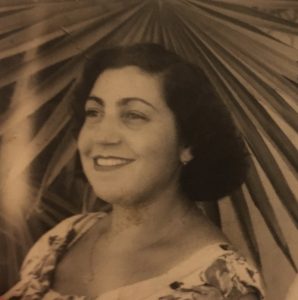A couple of weeks ago, my daughter sent me a link to passenger lists of Holocaust survivors who came to the US. Not many people know this, but the American people were against the immigration of Holocaust survivors and because of this enmity Congress and Truman heavily restricted immigration. My parents were lucky to come to America. Anyway, those ship manifests were fascinating and they led me down the rabbit hole of my family’s history.
I’d never been interested in constructing a family tree before. Given the war-devastated nature of my family, I didn’t think I’d find very much. Plus I was young and as is typical of young people, I didn’t care much about the past. But now I’m old and, surprise, history seems more important. Plus there are all kinds of online tools available to make finding info – even Polish and Ukrainian records – about my family a snap. Plus it turned out that unbeknownst to me other relatives I’ve never met and just plain curious genealogists had already posted major branches of my family tree online.
It took me an obsessive week to put all the online branches together and add some fresh info I found along the way. I found out exactly how I was related to the late congressman and Federal judge, Abner Mikva (second cousin once removed). I found my great, great, great grandparents’ marriage certificate and, more or less, how my grandparents were cousins. But maybe most importantly I found out about a somewhat mysterious cousin in my family, Fela.
Fela survived the war because of my father. When war broke out in September 1939, my father, who was living in Warsaw, fled immediately and went to his home town. He told his entire family that it was time for everyone to flee east, that Hitler would come and kill them all. Everyone thought my father was crazy except for his Cousin Fela. She was the one member of his family who went east with him to the Soviet Union. She was the one member of my father’s family who wasn’t murdered.
They ended up in Tashkent. My father joined Anders’ Polish Army and was almost killed by his own troop-mates during training because he was a Jew. Then my father was conscripted into Stalin’s Polish Red Army. After the war, he found Fela in Germany in a DP camp. She moved to Israel, my father moved to the US.
Fela had a hard life after the war. She married, lived in poverty and adopted a kid. Her husband died young, and then her kid grew up and cut ties with her. I met her in Israel once and she talked about marrying a rich American. I thought she was manic – mood swings and worse run in my family – and delusional. But no. She really had found, in middle age, a rich American living in Israel. She did marry him. It didn’t stick and she soon was back in poverty.
Through it all, my father would send her money, clothes and whatnot. She was the sad sack of the family in my estimation, the one who, in a family of strivers, lacked essential grit.
A few years ago, someone asked me online if I was related to Leon Rojstaczer, who he had met at a wedding or bar mitzvah (I can’t remember which event he mentioned) in 1968 in Chicago and who his father said was a cousin. I was amazed this person could remember an event and a family introduction from 1968. Leon was my father. The man’s own father, who was born and raised in a tiny town in Ukraine, also lived through the war, We texted a bit and tried to figure out how we were related. Somehow he mentioned Fela. It turned out that she was the likely connection. He, too, had met Fela in Israel. His father, too, had sent her money and whatnot for decades.
We still didn’t know exactly how we were related, though. There are no official records of Fela’s birth. I didn’t know her maiden name. I’d forgotten her married name. Last week, I woke up one morning and thought, “Maybe she gave testimony at Yad Vashem about her murdered family.” I went online that morning and, sure enough, it was there, individual documents about her parents, brothers and sisters murdered during the Shoah and signed in 1999 by Felitzia X. Fela = Felitzia, obviously. The name X matched the name on the back of the wedding photo below, a photo from 1952 that I found in my parents’ house and kept.
The names on the Yad Vashem documents were of Rojstaczers except for one. Fela gave the maiden name of her murdered mother. That name was the same as the last name of the man who contacted me online. Fela was a first cousin to both my father and his father. They were the closest relatives she had after the war.
In my old age, I think about Fela in a different light. I think of her in 1999 toward the end of her life. She felt compelled to take the bus from Tel Aviv to Jerusalem, and then take another bus to Yad Vashem. Fela took several sheets from a stack of forms and one by one unburdened herself of her profound loss. My father never did this. Fela did. One by one, she gave testimony about her murdered family. Hers was a life filled with hardship and worse. I don’t know how Fela got the emotional strength to make this trip. I think of her on that day filling out those documents by hand and am overcome with a strange mix of both sympathy and pride.


Recent Comments